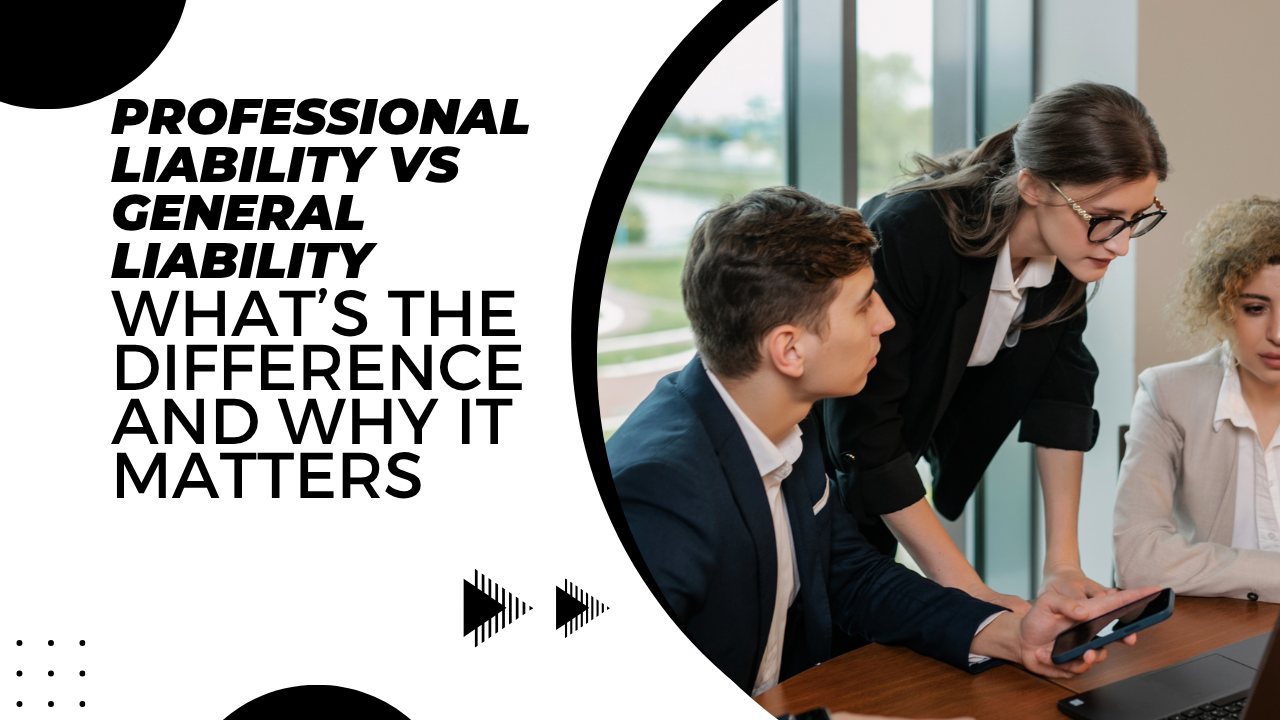Understanding Professional Liability vs General Liability Insurance
When running a business, having the right insurance is essential to protect yourself from unexpected financial and legal risks. Two of the most important types of business insurance—professional liability and general liability—serve very different purposes. Yet, they are often confused.
In this guide, we’ll break down the key differences between professional liability and general liability insurance, explain what each covers, provide real-world examples, and help you decide which policy—or combination—you need.
What Is General Liability Insurance?
General liability insurance, also known as Commercial General Liability (CGL), protects businesses from third-party claims involving:
-
Bodily injury
-
Property damage
-
Personal injury (e.g., libel or slander)
This coverage is crucial for businesses that operate physical locations, interact with the public, or sell tangible goods.
What General Liability Covers:
-
A customer slipping and falling in your store
-
Damaging a client’s property during a service visit
-
Legal fees for advertising-related claims like copyright infringement
What Is Professional Liability Insurance?
Professional liability insurance, often called Errors and Omissions (E&O) insurance, protects against claims that stem from negligence, mistakes, or failure to deliver professional services.
It is essential for businesses or individuals who provide expert advice, consulting, or specialized services.
What Professional Liability Covers:
-
Providing incorrect financial advice as an accountant
-
Missing a project deadline as a marketing consultant
-
Errors in architectural plans that result in financial loss
Key Differences: Professional Liability vs General Liability
Understanding these differences can help you determine which type of policy is right for your business:
| Aspect | General Liability | Professional Liability |
|---|---|---|
| What It Covers | Physical injuries, property damage, and advertising injury | Financial losses due to service errors or professional negligence |
| Policy Type | Usually occurrence-based | Typically claims-made |
| Best For | Retailers, restaurants, contractors, event planners | Consultants, financial advisors, lawyers, IT professionals |
| Excludes | Professional services and errors | Bodily injury or property damage |
| Claim Examples | Customer trips in your store | Client sues over faulty legal advice |
Do You Need Both Policies?
Many businesses wrongly assume they only need one type of coverage. But if your business has a physical location and offers services or advice, you may need both professional and general liability insurance.
Example Scenario:
An architectural firm might:
-
Face a general liability claim if a client trips in the office.
-
Face a professional liability claim if a design error causes a construction delay.
Without both types of coverage, the business could be financially vulnerable.
Who Needs General Liability Insurance?
You should strongly consider general liability if you:
-
Operate a retail store or restaurant
-
Run a construction or landscaping business
-
Host public events
-
Sell products or tangible goods
-
Lease commercial office space
Industries That Rely on General Liability:
-
Real estate
-
Manufacturing
-
Cleaning services
-
Hospitality
-
Fitness and wellness centers
Who Needs Professional Liability Insurance?
You need professional liability coverage if you:
-
Provide consultation or specialized advice
-
Handle sensitive data or financial decisions
-
Work under contract or licensing requirements
Professions That Require E&O Coverage:
-
Accountants and CPAs
-
Lawyers and legal consultants
-
Engineers and architects
-
Doctors and healthcare providers
-
IT professionals and software developers
-
Marketing consultants and graphic designers
Cost Comparison: General vs Professional Liability
Both types of liability insurance have different pricing models based on your business type and risk exposure.
General Liability Insurance Costs Depend On:
-
Industry risk level
-
Number of employees
-
Claims history
-
Business location
Professional Liability Insurance Costs Depend On:
-
Complexity of services
-
Annual revenue
-
Claims history
-
Contractual requirements
Tip: Professional liability insurance is generally more expensive because it covers high-stakes financial claims rather than physical damages.
Claims-Made vs. Occurrence-Based Policies
Understanding how each policy handles claims is crucial:
-
General liability is occurrence-based, meaning it covers incidents that happened during the policy period, even if the claim is made later.
-
Professional liability is claims-made, meaning the claim must be filed while the policy is active.
You may need tail coverage for E&O insurance to protect against future claims on past work.
Legal Requirements and Contractual Obligations
Many industries and contracts require specific types of liability insurance.
Examples:
-
Government contracts often mandate professional liability insurance.
-
Commercial leases may require proof of general liability insurance.
-
State licensing boards may enforce E&O coverage for doctors, lawyers, and financial advisors.
Debunking Common Myths
Myth 1: General liability covers all lawsuits.
Fact: It does not cover errors in your professional work or services.
Myth 2: Only large businesses need liability insurance.
Fact: Small businesses face the same legal risks—often with less capacity to absorb costs.
Myth 3: You don’t need professional liability if you’re careful.
Fact: Even the most meticulous professionals can be sued over misunderstandings or unfounded allegations.
How to Get the Right Liability Coverage
-
Assess Your Risk – Consider your services, clientele, and physical operations.
-
Consult an Insurance Broker – Get advice tailored to your industry.
-
Compare Multiple Quotes – Don’t settle for the first offer.
-
Consider Bundled Policies – A Business Owner’s Policy (BOP) can save money.
-
Review Annually – Your needs change as your business grows.
Conclusion: Protect Your Business the Smart Way
When comparing professional liability vs general liability insurance, the key is understanding your specific risk exposure. While general liability covers physical accidents, professional liability covers service-based mistakes. If your business offers both products and professional advice, you likely need both policies.
Don’t wait for a costly lawsuit to realize you’re underinsured. Talk to a licensed insurance agent today and ensure your business is fully protected.
You May Also Like:
